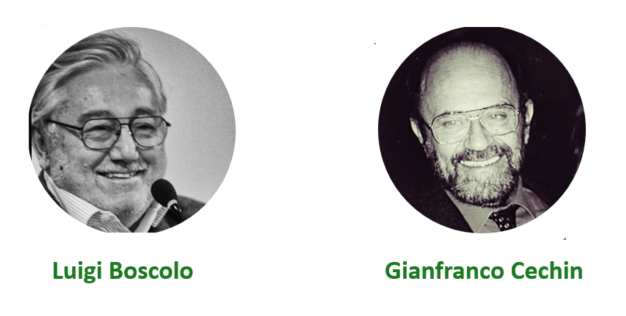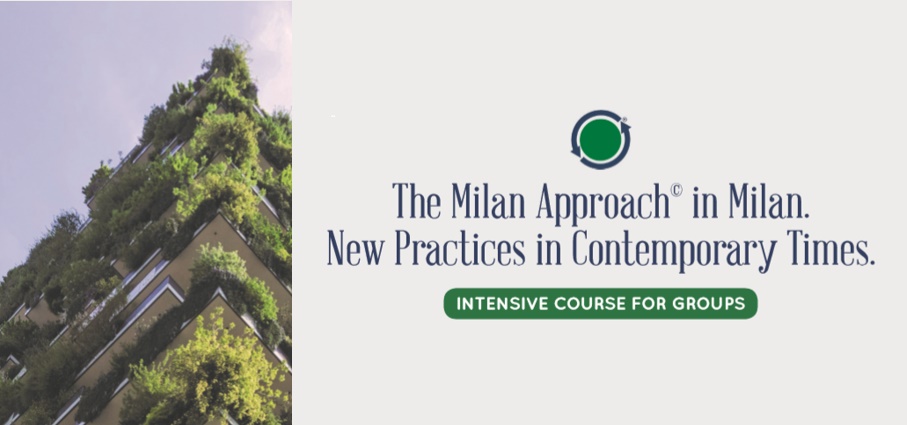The systemic relational therapy model today known as Milan Approach©, created by Luigi Boscolo and Gianfranco Cecchin, over the years has proved very helpful in facing complexity in social systems, educational, health and administrative institutions and in business organizations. It has also offered appropriate and effective means in order to produce significant changes.

Centro Milanese di Terapia della Famiglia (CMTF) organizes regularly at its premises in Milan intensive courses in English for professionals coming from all over the world and willing to know more about the Milan Approach© and its practices applied in contemporary psychotherapy.
2020 Edition: from Monday 11th to Saturday 16th May
- Duration: 6 days – Mon-Sat from 9.00 a.m. to 4.30 p.m
- Location: Italy – Via Leopardi, 19 – Milan
- Trainers: Jacqueline Pereira Boscolo, Pietro Barbetta, Vincenzo De Bustis Ficarola, Umberta Telfener, Micol Ascoli, Paolo Sacchetti, Fabio Sbattella, Marilena Tettamanzi.
- Costs: 900,00 €
We will provide information for Hotels in Milan, nearby the CMTF.
The enrollment at the intensive course includes some essays to be read in order to introduce the main topics of the intensive course. Those essays will be sent to the applicant immediately after his/her enrollment.
Information and organization
Antonella Boscolo: Email:segreteria@cmtf.it – Tel:+39 02 4815350 (call at Italian time 9:30 am-12:30 pm – 2:00pm – 5:00 pm).

Course Program
Day 1
- MORNING: Welcoming • Jacqueline Pereira Boscolo, Pietro Barbetta, Vincenzo De Bustis Ficarola “The practice of circularity in presentation”.
- AFTERNOON: Pietro Barbetta, Vincenzo De Bustis Ficarola“The alone child: how deal with this new form of existence in childhood”.
Day 2
- MORNING: Umberta Telfener “Reflexivity and recursive operations in systemic practice”.
- AFTERNOON: Umberta Telfener “Undesired outcomes in psychotherapy and systemic practice”.
Day 3
- ALL DAY: Paolo Sacchetti “Inner and outer worlds of the therapist: psychology of selves and systemic thinking”.
Day 4
- ALL DAY: Fabio Sbattella and Marilena Tettamanzi “Systems and Emergency”
Day 5
- ALL DAY: Micol Ascoli “Cultural delusions and their relevance in clinical practice; radicalism and conspiracy theories”.
Day 6
- MORNING: Vincenzo De Bustis Ficarola“Children as resources”.
- AFTERNOON: Pietro Barbetta “The art of becoming”.

Abstracts
Micol Ascoli
Cultural delusions and their relevance in clinical practice.
Cultural delusions, in the form of conspiracy theories and new radicalisms, are a social phenomenon of modern times which clinicians increasingly have to confront in their clinical practice, both as cause of stress and pathology when victimisation takes place, as well core psychopathological features eluding strict nosological definitions and refractory to conventional treatments.
The study day will consist of two parts:
Part 1: Racism and mental health: psychopathology, relational manifestations and clinical toxicity of the racist gaze on the other.
With the resurgence of nationalisms and populisms in Europe in the last few years, open and overt manifestations of racism and xenophobia can become a frequent occurrence as topics of discourse between therapist and patient in the consulting room. The teaching will be delivered through formal presentations, an experiential workshop and case discussions. Participants will also have the chance, if they so wish, to present cases from their own practice in the context of a group supervision session.
Part 2: Radicalism and conspiracy theories.
The session will deal more specifically with food radicalism, framed in the context of modern antiscientific conspiracy theories intersecting in the cognitive worlds of the radical “foodists”. The teaching will include a formal presentation, an interactive session based on tole play and participants can also present cases drawn from their own clinical practice.
Marilena Tettamanzi and Fabio Sbattella
Today it is very important to face emergency contest with psychological and psychotherapeutic attention to reduce psychopathological and traumatic evolution, to preserve individual and relation balances and to promote the systemic growth toward a new equilibrium in the future, based on present but in continuity with the past.
The Milan Systemic Approach it is an important chance to work in these contests, because is not focused only on traumatic experience and it allows a complex vision to work on multiple levels: the attention is focused on interaction between system involved as a victim and the Aid System, in accordance with the teachings of the second cybernetics. The lesson aims to deepen the application of Milan Ststemic Approach to natural disaster management, understood as systemic crisis. As example, we’ll present the methodology named “Basic Therapeutic Action”, to promote mental health in international contexts perturbed by collective trauma.
Paolo Sacchetti
“Inner and outer worlds of the therapists: Psychology of the Selves and Systemic Thinking”
The richness of Systemic Thinking, as it was described by the founders Dr. Luigi Boscolo and Dr. Gianfranco Cecchin, can have, in its clinical and teaching application, a fruitful and stimulating development when it is embodied and embedded with the model of the Psychology of Selves (Voice Dialogue).
The idea of the sub-personalities (Selves or Energies), which perceive, feel, have cognition, etc. in the model of the Psychology of Selves, can hold the systems of meanings which underly people’s relations with the world and the other human beings. Selves develop in an individual to adapt them to survive in the world and in their significant relationships from the earliest stages of the life. After a theoretical presentation of the framework of the link between the two models, the workshop will be focused on the lives of the therapists, on clinical examples, work with dreams, and exercises.
Pietro Barbetta
The art of becoming.
The seminar will deal with the difference between being and becoming in the mind of the therapist. The Western diagnostic process is mainly based on a structuralist approach, where diagnosis is considered a pathological stable way of being of the person or the family. During these last thirty years, we got a very viable insight by Luigi Boscolo and Gianfranco Cecchin: the idea that we should no longer use the word “human being” as a word that shapes the mentality of the therapist. Instead of “human being” the idea of “human becoming” creates a mind where the therapist can create with the family the perspective of change and de-pathologize the so called Identified Patient. Clinical examples will follow.
Vincenzo De Bustis Ficarola and Pietro Barbetta
The alone child: how to deal with this new form of existence in childhood.
During the workshop, we will present some clinical cases concerning the idea of the “alone child” in Italy, a country where persists a strong family pattern that reduces the number of children in the family. The alone child could be also the never born child, due, for example to the increasing number of cases of infertility. We are facing of an increasing amount of biological infertility, particularly from the male partners, and an increasing amount of psychological infertility within the couples. This phenomenon from the relational point of view, involves both the cases of infertility (the desired child, with the increasing number of adoptions), cases of couple with one child and even couples of two children. Where from does it come this supposed “natural” (actually social and psychological) phenomenon? Where does it dwell their systemic unconscious, in the family with an only child?
Vincenzo De Bustis Ficarola
Children symptoms are like birds picking at the window glass, they need attention, welcoming and tenderness.
In the Milan Approach, children are always considered important resource, both in the case where on of them is the identified patient, and where they are in the therapy session with another member of the family as identified patient, as for example where there is ion the family an anorexic sister in her adolescence or young adulthood. During the seminar I will analyze with the group some key moments of conversation in therapy with the aim of showing the “becoming child” of the therapist.
Umberta Telfener
Reflexivity and recursive operations in systemic practice.
In a constructivistic perspective the clinician doesn’t know more and better than the customer: its theories, hypothesis, narratives are nor true nor false, they are plausible, exactly as the ones of the clients. What differentiates them is the fact that the hypothesis of the therapist must remain at a different logical order: not as content of knowledge but as process which organizes knowledge, a second order processes which implies knowing one’s knowledge. Interventions emerge from a shared reality within a collaborative, co-responsible and dialogical context. Our work is transversal to contexts and culture awareness has become more and more the fundamental ingredient. We will reflect therefore on the operations the clinician must perform and on her/his responsibilities.
Undesired outcomes in psychotherapy and systemic practice.
The clinician is the person who understands events and narratives, s/he who enters into unexplored domains. S/he must also be aware of the possibility of unexpected outcomes that occur nearly inevitably during the process. We operate on undeterminable systems and undecidables questions – as Heinz von Foerster would state – considering the inevitable presence of blind spots. We risk to resonate, to collude, to become doctor Homeostat, to create cronicity. The work together has the aim at reflecting on the risk of iatrogenic risk (iatreia = cure, gignomai = to emerge) the risk coming from the cure, which hasn’t to do with the severity of the symptoms or of the situation nor with the personality of the people involved. It emerges from what has happened during the clinical dance. My seminar therefore has to do with the clinical



